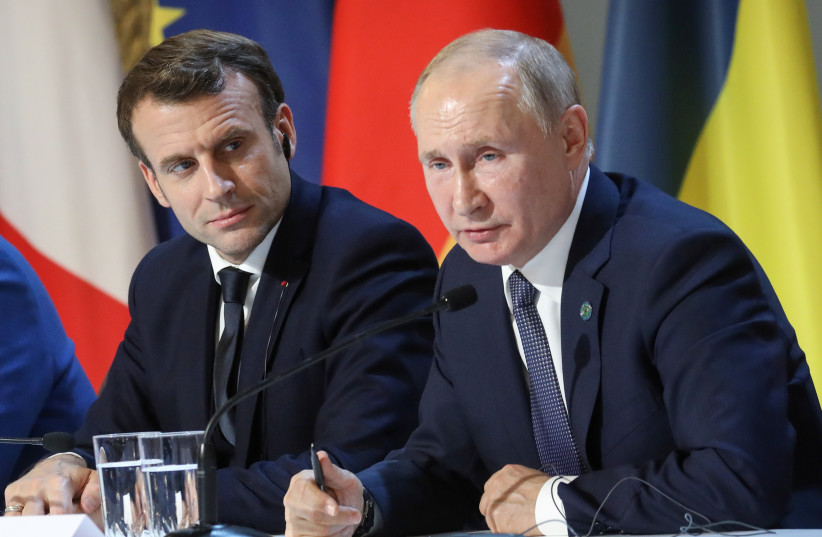France has made important decisions in supporting Ukraine in the past year. One year after the Russian invasion, French support hasn’t stopped.
US President Joe Biden visited Kyiv earlier this week. It was another illustration of how the US, France and other countries are increasingly committed to the rule of law amid an international order in which democracies are supported against authoritarian regimes and countries have a right to defend themselves.
France plays role in stopping Russian masterplan
Russia’s invasion a year ago was designed to upset the current international balance, redrawing borders and challenging the West. Moscow believed it could accelerate its decline.
France, under President Emmanuel Macron, has played an important role in stopping that. Macron attempted to prevent the invasion in early February 2022, meeting with Russian President Vladimir Putin.

France also kept dialogue open with Russia in the first month of the war. This has not resulted in a change in Moscow’s position so far. Recently, the BBC noted that Macron “urged Western nations to increase military support for Kyiv and said he was prepared for a protracted war.” He said the goal was to enable Ukraine to defend its position.
“I do not think, as some people do, that we must aim for a total defeat of Russia, attacking Russia on its own soil,” Macron told Le Journal du Dimanche, according to reports.
In a statement on Friday by Nicolas De Riviere, the permanent representative of France to the UN, France reiterated its position.
“Russia thus made the choice of war in spite of the efforts for de-escalation led in the previous days and weeks by President Macron and Chancellor [Olaf] Scholz,” he noted.
“The law is also very clear. The United Nations secretary-general and General Assembly immediately condemned the invasion as a violation of international law and the [UN] Charter,” De Riviere continued. “The International Court of Justice ordered the suspension of Russian military operations on March 16, 2022. The one and only lesson to be learned here is that Russia, by attacking Ukraine, has chosen, alone, to put an end to dialogue and negotiation. It took the decision alone to shatter the Minsk agreements, whose main objective, let us remember, was the reintegration of some regions of Donetsk and Luhansk under full Ukrainian sovereignty, in exchange for broad decentralization.”
Increasing challenges in Ukraine
Today, Russia is facing increasing challenges in Ukraine, thanks to Western powers increasing the supply of munitions and heavier weapons to Kyiv, including armored vehicles. There have even been suggestions that Ukraine might one day receive warplanes from the West.
WHILE RUSSIA failed in its initial goals to take Kyiv last year, it has continued to destroy swaths of Ukraine along the front lines where the clashes occur. Russia is also continuing to mobilize mercenaries and troops.
The importance of the invasion is clear across Europe. Equipment, along with billions of euros have been spent and pledged, while formerly neutral countries are now backing Ukraine. There are still hurdles – such as Turkey blocking Sweden and Finland from joining NATO – but the trend is clear.
Even at the international level, there has been widespread condemnation of Russia’s invasion and its annexation of parts of Ukraine. Moscow has only a few open supporters at the UN, though it still holds some sway with abstentions.
France is a key European player – along with Germany – on these issues. It is also a global leader with a historic role and interests around the world. All this means that Macron’s decisions on Ukraine reverberate in West Africa as well as in other countries it already supports, like Armenia, and in the fight against terrorism.
An article at The National this week written by Robert Tollast noted, “France will continue to send weapons to Ukraine, a French diplomatic source said on Monday at a closed briefing for journalists, saying there was currently little prospect of near-term peace talks to resolve the conflict.”
Amid plans by France to send AMX-10 armored vehicles, Tollast also noted, “Asked by The National if France would consider sending Leclerc tanks, more powerful than the AMX-10, the source said France had been working on meeting Ukraine’s immediate needs on the ground, which includes agile equipment on the front lines.”
The Defense Post noted that France will begin delivering the AMX-10 soon, perhaps as early as next week. Caesar self-propelled howitzers will also be sent as soon as possible. France said several weeks ago that it would ship 12 more of the truck-mounted system to Ukraine, according to Defense Minister Sebastien Lecornu. These would join 18 of the systems already sent to Ukraine, bringing the total to 20.
Denmark is reportedly sending the same system to Ukraine, which means Ukrainians will be able to train on this one system and not on numerous different types. This issue has been one major struggle for Ukraine amid support from the US and Europe.
Different countries use different types of tanks, armored vehicles and artillery. As a result, the Ukrainians have ended up with all sorts of systems, including Western systems and old Soviet-style ones.
When soldiers need training on advanced artillery systems or vehicles, it’s a problem if they only have a handful. Nevertheless, Ukrainian forces have proven steadfast and agile in their quick understanding of all these defensive weapons. Countries like France continue to play a key role in support, both in terms of equipment and global leadership, at both the international and regional levels.
